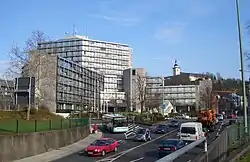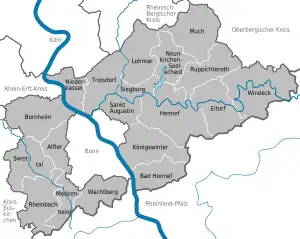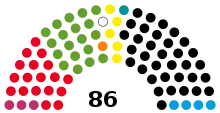Rhein-Sieg-Kreis
The Rhein-Sieg-Kreis (Kölsch: Rhein-Siech-Kreis) is a Kreis (district) in the south of North Rhine-Westphalia, Germany. Neighboring districts are Rheinisch-Bergischer Kreis, Oberbergischer Kreis, Altenkirchen, Neuwied, Ahrweiler, Euskirchen, Rhein-Erft-Kreis, the urban district of Cologne. The federal city of Bonn is nearly completely surrounded by the district.
Rhein-Sieg-Kreis | |
|---|---|
 Kreishaus Siegburg | |
 Flag  Coat of arms | |
| Country | Germany |
| State | North Rhine-Westphalia |
| Adm. region | Cologne |
| Capital | Siegburg |
| Government | |
| • District admin. | Sebastian Schuster (CDU) |
| Area | |
| • Total | 1,153.51 km2 (445.37 sq mi) |
| Population (31 December 2021)[1] | |
| • Total | 600,732 |
| • Density | 520/km2 (1,300/sq mi) |
| Time zone | UTC+01:00 (CET) |
| • Summer (DST) | UTC+02:00 (CEST) |
| Vehicle registration | SU |
| Website | https://www.rhein-sieg-kreis.de |
History
The district as known today was created in 1969, during the reorganization of the districts in North Rhine-Westphalia, by merging Sieg District with the District of Bonn (from which Bonn itself was separated in 1887 to become an urban district). Sieg District was created in 1825.
Geography
Geographically Rhein-Sieg District covers the valley of the river Sieg and also, since the merger with the District of Bonn, that of the Rhine around Bonn, as well an area in the most easterly part of the Eifel.
Politics
Municipal elections are held every five years, in which the district administrator (German: Landrat) and district council (German: Kreistag) of the Rhein-Sieg-Kreis are chosen. The last election took place on 13 September 2020.[2]
District council
The district council consists of 86 seats, half of which are chosen directly in 43 constituencies. The remaining 43 seats are distributed via party lists, resulting in a proportional representation.
On 3 November 2020, the Christian Democrats and the Greens announced their coalition agreement, renewing their 21-year governance.[3]
District administrator
The district administrator is Sebastian Schuster. The Christian Democrat received 53.18% of the vote.[4][5]
Coat of arms
The red lion is the symbol of the dukes of Berg, who owned a large part of the district. The black cross in the shield is the symbol of Cologne, because another part of the district was owned by the bishops of Cologne. The yellow sword is the symbol of Saint Michael, the patron of the mighty Michaelsberg Abbey in Siegburg.
Demographics
Number of 1st and 2nd generation foreigners in Rhein-Sieg-Kreis by top 10 country of origin per 31 December 2007[6]
| Rank | Ancestry | Number |
|---|---|---|
| 1 | 13,255 | |
| 2 | 3,982 | |
| 3 | 3,024 | |
| 4 | 2,825 | |
| 5 | 1,353 | |
| 6 | 1,284 | |
| 7 | 1,272 | |
| 8 | 1,244 | |
| 9 | 1,203 | |
| 10 | 994 |
Towns and municipalities

| Towns | Municipalities |
|---|---|
References
- "Bevölkerung der Gemeinden Nordrhein-Westfalens am 31. Dezember 2021" (in German). Landesbetrieb Information und Technik NRW. Retrieved 20 June 2022.
- "Kreistagswahl - Kommunalwahlen 2020 im Rhein-Sieg-Kreis - Gesamtergebnis". wahlen.kdvz-frechen.de (in German). Retrieved 13 November 2020.
- Akalin, Dylan Cem (4 November 2020). "Hubschrauberrundflüge verboten: Koalition im Kreistag Rhein-Sieg will Digitalisierung forcieren". General-Anzeiger Bonn (in German). Retrieved 13 November 2020.
- "Wahl des Landrates/der Landrätin - Kommunalwahlen 2020 im Rhein-Sieg-Kreis - Gesamtergebnis". wahlen.kdvz-frechen.de (in German). Retrieved 13 November 2020.
- Köhl, Bettina; Heinemann, Thomas (13 September 2020). "Klares Ergebnis im Rhein-Sieg-Kreis: Landrat Sebastian Schuster macht weiter". General-Anzeiger Bonn (in German). Retrieved 13 November 2020.
- "Ausländer_2006-2007_Kreise.xls" (PDF). Retrieved 12 March 2013.
External links
- Official Website (German, English, French)

